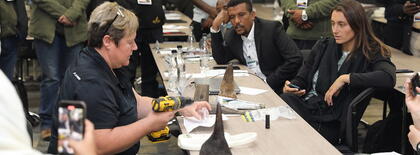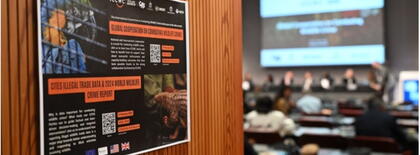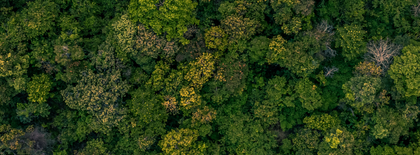CITES Tortoises and Freshwater Turtles Task Force
Singapore, 25-27 April 2017
Welcome remarks by John E. Scanlon, CITES Secretary-General
Chief Executive Officer, Ms. Tan Poh Hong,
Senior CITES Specialist, Mr. Bruce Weissgold,
Distinguished guests, friends and colleagues from CITES Parties and international organizations,
Good morning to you all and welcome to this very important, and timely, CITES Tortoises and Freshwater Turtles Task Force meeting!
Let me start by expressing our deep gratitude to the Agri-Food and Veterinary Authority of Singapore and Wildlife Reserves Singapore for co-hosting this Task Force meeting.
I would also like to sincerely thank the Government of the United States of America for its generous financial support that has enabled the Task Force to convene.
I am delighted that two CITES Secretariat staff members are able to join you for this meeting. Ben Janse van Rensburg, our Chief of Enforcement Support, and Johannes Stahl, our Enforcement Support Officer at the CITES Secretariat. Both Ben and Johannes will be working closely with you throughout this meeting, and stand ready alongside our generous co-hosts, to provide you with all of the support you may need.
As you know, a comprehensive report on legal and illegal trade in specimens of tortoises and freshwater turtles was considered at the 17th meeting of the Conference of the Parties to CITES (CoP17) held in Johannesburg, South Africa, in September last year. This report highlighted that a staggering number of 3.5 million live tortoises and freshwater turtles were legally exported during the four-year period between 2011 and 2014, the vast majority of them coming from captive-bred origin.
While this legal trade in these species can be beneficial to local communities and national economies, there is significant and increasing concern about the illegal trade in tortoises and freshwater turtles.
In the period 2000 to 2015, more than 300,000 illegally traded tortoises and freshwater turtle specimens were seized, in more than 2,500 individual seizures. These animals primarily originated from the wild, and their number equates to approximately 19% of the volume of legally traded wild-sourced tortoises and freshwater turtles.
The Indian star tortoise is the species most frequently confiscated, with more than 34,000 animals seized between 2000 and 2015. It is followed by the pig-nosed turtle with more than 29,000 animals seized; the Asian box turtle with over 20,000 animals seized; the Indian softshell turtle with over 16,000 animals seized; and the spotted pond turtle, with over 11,000 animals seized.
Many seizures of tortoises and freshwater turtles seem to involve small numbers of animals that are carried or kept as personal pets or souvenirs, but more significantly, a smaller number of seizures of large to very large shipments containing several hundreds or thousands of live specimens, suggests the involvement of well-organized criminal networks.
Despite the availability of good identification materials for live tortoises and freshwater turtles, accurately applying them can at times pose a challenge because of the variability in appearance of many species with age, and between individuals. In contrast to the wide range of materials available for identifying live tortoises and freshwater turtles, materials for identifying their parts and derivatives are not so readily available, and even with the best identification materials at hand, some specimens are very difficult to identify and examination by specialists with extensive experience, or forensic analyses, is often necessary.
Taken together, these dynamics pose significant challenges to enforcement efforts to combat illegal trade in tortoises and freshwater turtles.
Distinguished colleagues,
This very brief overview shows why it is critically important that you are attending this Task Force meeting in Singapore this week, which is being convened as a direct outcome of the deliberations at CoP17.
A significant and important task rests upon your shoulders as the participants to this meeting. This week you will have a unique opportunity to develop strategies to strengthen CITES implementation and law enforcement responses to address illegal trade in tortoises and freshwater turtles, including their parts and derivatives, to identify best practices and new innovative approaches, as well as to determine how to better share information and intelligence.
I would like to encourage you to enhance your efforts to collectively tackle the illegal trade in tortoises and freshwater turtles and in doing so to build strong professional relationships with your counterparts from other countries, which is an intangible outcome but is equally critical if we are to succeed.
We will rely upon your knowledge, experience, skills and active participation in this Task Force meeting, to ensure that its outcomes will provide us all with a strong basis for concrete action to address illegal trade in tortoises and freshwater turtle specimens.
I therefore most sincerely thank all of you for attending this meeting, and for giving this important issue the attention that it deserves.
I wish you every success with your extremely important work and look forward to learning of the outcomes.
Thank you.



